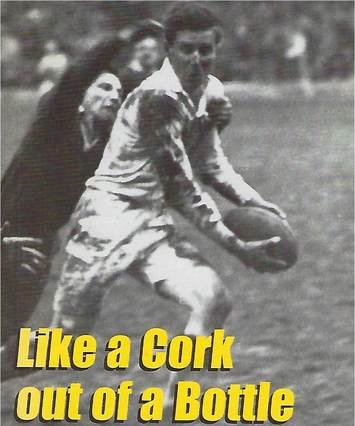In my university days I was too much of a sportsman to take my subject, history, seriously enough. For instance the summer term meant cricket 11.30 - 6.30, except on Sundays. So it was impossible to go to lectures. Luckily my tutors took a lenient view of the situation!
But I did learn to love history, especially biography, and I did learn to make notes on every book I read; and I've managed to do that ever since, including novels, bible commentaries, bird books, poetry, children's books - jotting down any sentence or insight that seems to stand out.
Winnie the Pooh and Alice in Wonderland are full of wisdom as well as absurdity!
Early in my spiritual journey I ran into the useful word 'Relate', the importance of relating faith to daily life. I discovered in the writings of William Barclay, the Scottish theologian, more about the Roman world into which Christ came with His dazzling message.
Barclay quotes the Roman writers: Propertius - 'I see proud Rome perishing, the victim of her own prosperity'; Juvenal - 'Enervating riches sapped the sinews of the age with foul luxury'; and Tacitus - 'Crime became the only antidote to boredom. The greater the infamy, the greater the delight'.
Very topical!
In his book The Mind of St Paul, Barclay writes: 'The resurrection proves that truth is stronger than falsehood, that good is stronger than evil, that life is stronger than death, that love is stronger than hate.'
Barclay refers to a historical novel written in 160ad describing Paul as follows: 'A man of little stature, thin-haired on the head, crooked in the legs, of good state of body with eyebrows meeting and a nose somewhat hooked, full of grace. For sometimes he appeared as a man and sometimes he had the face of an angel.'
Paul seems to have been no beauty!
I find myself constantly returning to his great truths:
The whole wide world is on tiptoe waiting to see the wonderful sight of the sons of God coming into their own.
He is able to do exceedingly abundantly above all we ask or think, in you, through you.
The letter kills, the spirit gives life.
This one thing I do - I leave the past behind and reach out to what lies before.
Barclay points out that the Greek word for reaching out is the same as for an athlete at the end of a race, going for the tape.
This is just one of eight sporting references in the epistles of Paul. He surely attended the Isthmian Games which took place in Corinth and drew people from all over Greece.
No wonder that Paul has often been called an athlete of the Lord - a truly all-out person.


